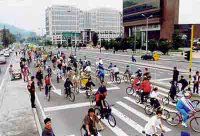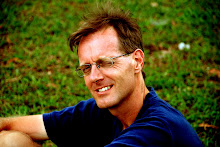
Enrique Peñalosa, former mayor of Bogotá, believes that cities of the Third World can offer us lessons about urban quality-of-life.
PEÑALOSA'S IDEAS STAND as beacon of hope for cities of the South, which will absorb much of the world's population growth over the next half-century. These are places with the usual complications of rapid urban expansion (pollution, slums, crime, unemployment, sprawl, corruption, traffic) aggravated by deep poverty. Based on his experiences in Bogotá, however, Peñalosa believes it's a major mistake to give up on these places, no matter how out-of-control their problems appear.
"If we in the Third World measure our success or failure as a society in terms of income, we would have to classify ourselves as losers until the end of time," declares Peñalosa, a tall man with salt-and-pepper hair and trim beard. "With our limited resources, we have to invent other ways to measure success. This might mean that all kids have access to sports facilities, libraries, parks, schools or nurseries."
Link to this article




















